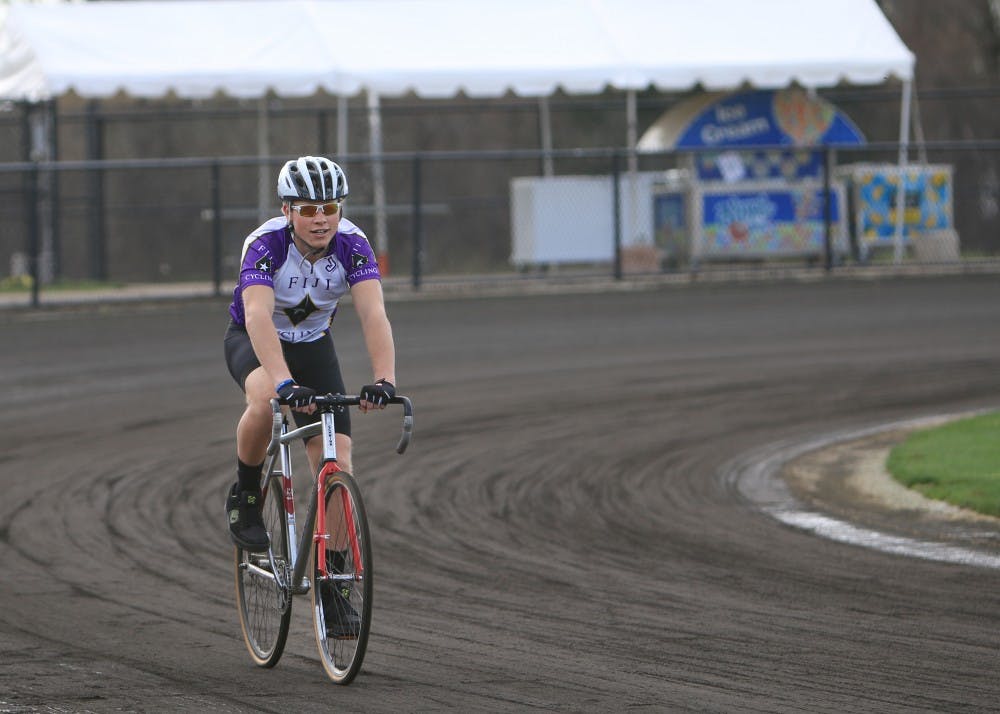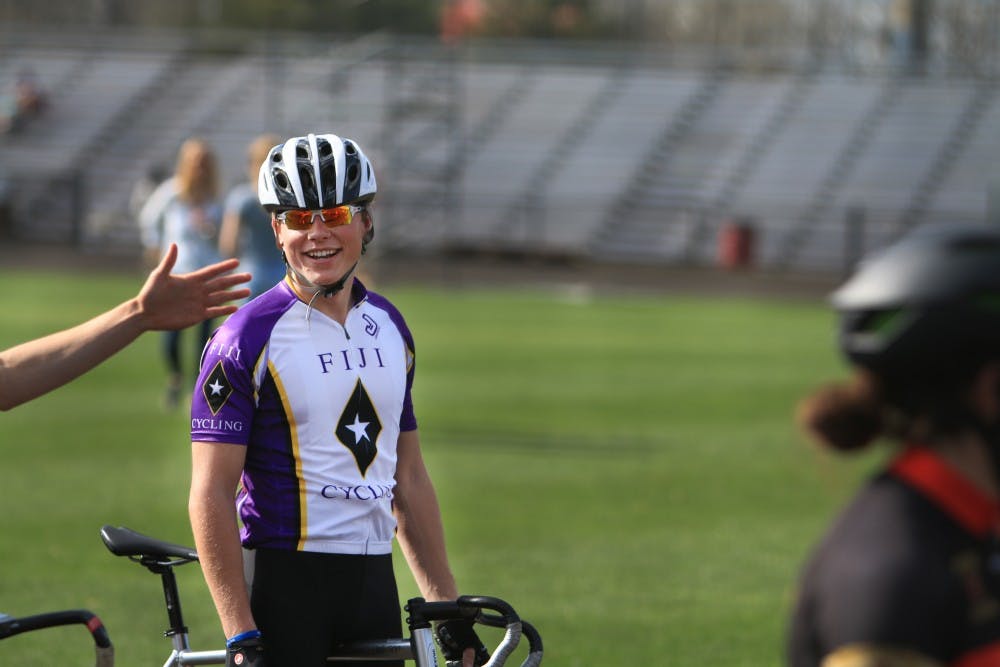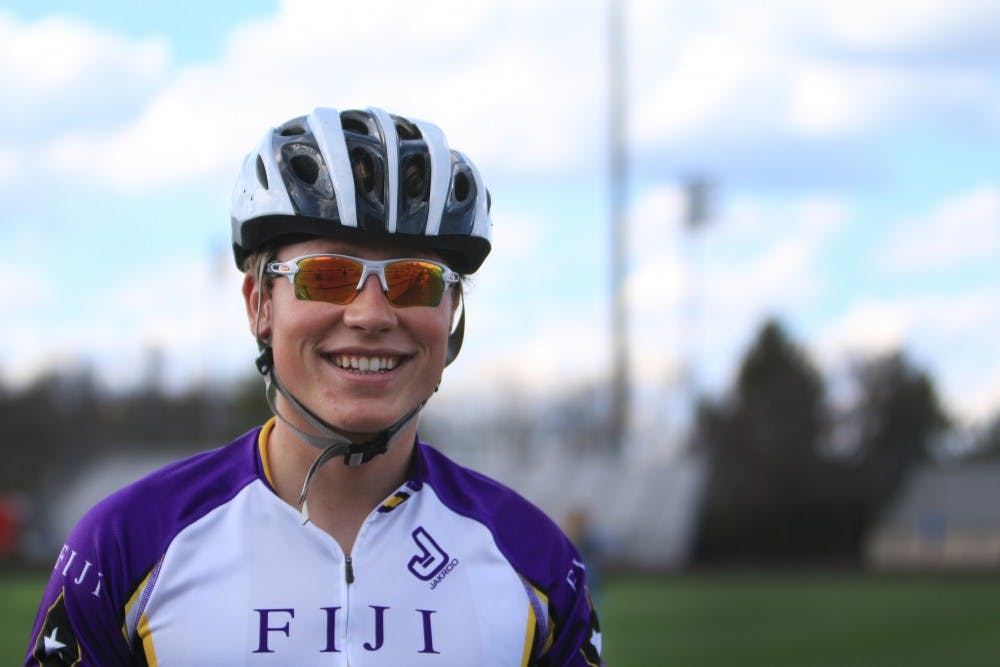He called it one of the best days of his life.
As a freshman, Matt Cooper rode for Phi Gamma Delta cycling in the 68th running of the men’s Little 500.
Cooper woke up the morning of race day with over 20 texts from friends, family and other people in the Fiji house wishing him good luck. Cooper said he was nervous because he was the only freshman on the team, but his supporters told him he was chosen to ride for a reason.
When it came time for the send-off to the race at the Fiji house, everyone started chanting his nickname, “Munchies,” which started because of his love for blueberry and brown sugar cinnamon Pop-Tarts.
Cooper and the other members of Phi Gamma Delta wore candy-striped shirts and black compression shorts for the race. When the Little 500 got underway, Cooper finally heard his name at lap 30 when Fiji coach Jim Lohman yelled that they needed him.
“Oh shit, here’s the bike,” Cooper thought as he got set for the handoff.
His heart rate spiked after the first lap but his nerves calmed down. This wasn’t as difficult as he imagined it to be.
His next few laps went just fine. Then lap 170 hit. He was on the inside of the pack when a Cutters rider accidentally bumped into him, and Cooper went crashing into the gutter.
The crash left him with cinder shards in his left leg, but the adrenaline rush from the race masked the pain.
Fiji was the last team to complete the full 200 laps and finished in 17th place. Cooper is Fiji's only remaining rider from last year’s Little 500 race day team.
The failure to crack the top-15, his unfortunate crash, the extra-difficult training miles all don’t wipe the smile off Cooper’s face one year later. He’s just happy to be on a bike without being connected to an IV.
On Feb. 16, 2016, Debbie Cooper was in the middle of a meeting at work when her phone started ringing constantly.
When she finally could check her phone, she had multiple missed calls from the pediatrician’s office.
“Debbie,” the voicemail said, “this is Dr. Harper, you need to call me the second you get this message. I also tried to call your husband.”
In the 15 years that they lived in the Carmel area, Dr. Harper never tried to call her husband.
She went to the lunchroom to call the office at around 9 a.m. Dr. Harper was waiting for her call, and once he gave her the news, she left the office and never went back to work.
“I’ve got to go,” Debbie said she told her boss on the way out. “My child has cancer.”
As long as he could remember, Matt Cooper loved to run.
He joined the Carmel High School cross-country team and made varsity heading into junior year after impressing in summer workouts. After feeling great during the summer, his times worsened in August. He couldn’t explain why. Then his hamstring and his back started to ache in October. He just brushed it off.
He was feeling tired, and it was becoming difficult for him to make it up the stairs at school without running out of breath.
“I kept ignoring the symptoms,” he said.
After waking up covered in sweat three nights in a row, he finally got tested to see what was wrong. When the results came back negative, Debbie Cooper suggested they get his blood tested because maybe something bigger was off.
While his mom rushed to Carmel High School, Matt sat in the second row of his U.S. History class when his teacher received a call.
His teacher told him that his mom was in the front office and that he needed to leave right away.
As he made his way down to the front office, multiple thoughts ran through his head. When he got to the office, he had a smile on his face but when he saw his mother, he noticed she had been crying and thought maybe one of his family members had been in a car accident.
He asked her what she was doing at the school, but she strictly told him to get his stuff and that they were going to the hospital. Matt kept being persistent, wanting an answer, but his mom wouldn’t budge.
Matt was stern with her and demanded an answer to what was going on.
Finally, as they got into the car, his mom told him he had leukemia.
No way, he thought. No way.
As they made the 13-minute drive from the school to Riley Hospital for Children, Matt did the first thing patients are told not to do when they first learn they have cancer — look up the symptoms on Google.
He found a checklist: fatigue, night sweats, swollen lymph nodes, back pain. It was like a grocery list. He could scroll down and check each of them off.
Everything he was experiencing all began to make sense.
There was one more thing Debbie said she told the school’s front office before her son arrived.
“He’s not going to be back for a while.”

Test results showed that 90% of his cells were cancerous.
He was emotionless and in complete shock when he got to the hospital.
When the nurses were helping him get comfortable after he checked in, he heard a familiar voice. One of his best friend’s mom was a nurse at Riley and saw him and said, “Oh my god, that’s Matt Cooper, he runs with my son.”
When he heard her voice, it all finally hit him at once. He started bawling because he knew what was happening was actually real.
Matt was initially diagnosed with acute myeloid leukemia, a very aggressive cancer. According to the Leukemia and Lymphoma Society, the five-year relative survival rates overall were 27.4%.
But his diagnosis got worse. After testing him twice, doctors discovered he also had acute lymphoblastic leukemia mixed with the AML in his system.
The reason why he wasn't getting better was clear.
“We suddenly understood why things hadn’t been working,” Debbie Cooper said. “Why he had these aches and pains. Why certain things weren’t going the way we assumed they were going to go. Most people have either one or the other, they don’t have both.”
Just 10 days later, Debbie received another catastrophic call.
The oncologist told her that Matt’s blood work had just come back from Seattle.
His blood work showed traces of a genetic mutation called Fetal Liver Tyrosine Kinase 3, FLT3. His only chance to live was by a bone marrow transplant, but even then, he only had a 20-30% chance of surviving according to the oncologist.
Matt thought his life was over.
According to Healthline, a medical information website, FLT3 is a mutation in leukemia genes that happen to 20-30% of people with AML. The mutation encourages the growth of too many abnormal leukemia cells.
For five months, Matt remained at Riley’s, before being taken to Cincinnati Children’s Hospital for his bone marrow transplant. His family moved into an Embassy Suites to remain with him and lived there for 100 days.
“We had a couple rough patches during the transplant, but I always reminded him that we were ahead of the game and he was still going to get to do everything he wanted to do,” Debbie said.
One constant Matt maintained through his time in the hospital rooms was an opportunity to exercise — it was one of the first things he asked for upon arrival.
They put a small stationary bike, that sat low to the floor, to the left side of his bed. He’d spend an hour or two each day cycling with an IV connected to his left arm to help take his mind off the treatment.
“Having that stationary bike in my room was everything to me,” Matt said. “It gave me a time to relieve my stress and exercise and feel like a normal high schooler again. That’s where I sort of found my passion for biking, at Riley Children’s Hospital.”
Sometime between the start of his bone marrow transplant in June to early July 2016, he started experiencing massive headaches. They kept occurring but weren’t normal for his treatment and the doctors thought it could’ve been swelling in his brain or something else serious.
The headaches were just the latest struggle. Before the transplant, he weighed 164 pounds but lost roughly 35 pounds. During the transplant process, he started to get frustrated because he wasn’t getting any better. Sometimes it became hard to take a shower because the warm water would make his muscles so relaxed and weak.
“A transplant doesn’t work for a couple reasons,” Mark Muller, Bone Marrow Transplant Care Manager at Cincinnati Children’s Hospital said. “One, the patient relapses, cancer comes back, about 10-40% Two, they lose their graft, less than five percent. Third, they have a life-threatening complication, less than 10%.”
One night at 11:45 p.m., he was forced to get an MRI to check on his brain.
As they took him down the hallway in a wheelchair, he got to the room and realized there was a 10-minute wait for the MRI..
“I’m pissed because why the hell do I have to wait for an MRI at freaking midnight,” Matt said.
The doctor told him that someone else was getting radiation treatment when he got there.
He wondered who could possibly be getting radiation treatment this late at night.
Then, a 4-year-old girl with a half head of hair walked out of the room, waved and smiled at him. It was a moment that shifted his entire perspective of what he was going through.
“Damn, if this girl can have such a positive attitude and make me smile, I just promised to myself that if I lived, I was going to do the same thing,” Matt said.
As Matt went through his bone marrow transplant, there were other drives in his name going on at the same time through Be The Match, an organization that helps patients needing bone marrow transplants find donors.
Matt’s donor was a woman from Germany. In order to be a match, a person has to check off eight of the ten boxes. She checked off nine.
His brother held one at Saint Louis University and there were multiple others at Carmel churches and elementary schools.
“It’s such a humbling experience with the chemo and bone marrow transplant because we take so much stuff for granted,” Matt said.
On Aug. 3, 2016, Matt Cooper cried tears of joy for the first time.
He officially became an outpatient from the hospital, though he still needed to live with his family at Embassy Suites until toward the end of September.
The first thing he did when he got to the hotel was run one mile.
He put on latex gloves and a mask after they sanitized the workout room. Within a 10-minute pace, he ran .8 miles before he was out of breath and had to walk the remaining .2 miles.
To him, there was no greater feeling. It was the first step back to living a normal life again. Two weeks later, he texted his Carmel track coach to find out if he should be going for speed or mileage during his training.
By Sept. 23, 2016, they were finally allowed to move back to Carmel. Matt wasn’t allowed to go back to school yet due to the risk of getting sick again. He was forced to stay in the Homebound program as teachers would work with him for two hours per week in each class.
It wasn’t until April 10, 2017, that he went back to school for the final six weeks of senior year with his friends.
Matt was originally committed to walk on at Miami University for track and cross-country. Despite the school's patience with his treatment, he decided to decommit April 30 and put his payment down at IU the same day.
“I can’t run in 20-degree weather since I’d get the flu or a fever,” Matt said.
Cooper didn’t think he’d end up at IU originally, but he knew he’d get in and it was close to Riley’s for precautionary reasons.
At a Carmel track meet Matt met an IU junior who suggested he should consider rushing should he choose to go to IU.
Cooper thought he was crazy.
“You think of the stereotypical fraternity system and it’s not good,” he said.
The IU student reassured to Matt that he should at least give it a try. Matt did and attended a Fiji rush event. He immediately knew that he wanted to be a part of the fraternity and moved into the house August 17 as a freshman.
At his one-year checkup, he was still cancer free while 100% of his cells were from a donor.
After Matt joined Fiji, he met senior Bobby Coyle, who was on the fraternity's Little 500 team.
Considering he biked so often in the hospital, he figured he’d give it a shot. The first route that he rode with Coyle and alumni was 36.5 miles that loops around the outskirts of IU’s limestone buildings and through the mature hardwood trails that the Morgan-Monroe State Forest has to offer.
“I really fell in love with the beauty of Bloomington because it’s gorgeous when you get outside of the city,” Matt said. “That’s when I realized I wanted to continue doing this.”
It was passion he was able to take from his hospitalized stationary bike to the streets of Bloomington, but it wasn’t the only thing he brought to IU from his time in the hospital.
Matt has found a way to give back to those who suffer what he did by partnering with IU’s Riley Children’s Dance Marathon. His “Why I dance” statement is based on the encounter he had with the 4-year-old girl he met the night of his brain MRI.
In the two years that Matt has participated with the dance marathon, he’s raised roughly $5,200.
“After going through the treatment, I realized that grades, work, athletics, that’s second,” Matt said. “First is how you treat other people and how you give back.”

The night before the 2019 Little 500 Qualifications, Matt Cooper couldn’t stop coughing.
He and his other teammates were on the phone with their coach, discussing strategy for the first Spring Series event. Matt realized his sports-induced asthma — a condition that only appears when he’s really pushing his limits — was flaring up.
Matt decided to go to the emergency room to get checked out. They took his blood and he got a chest X-ray. He was diagnosed with walking pneumonia and had to get antibiotics at 1:30 a.m., just hours before Qualifications started.
Walking pneumonia wasn’t going to keep him out of the action.
Despite the inexperience of Fiji in 2019, the goals that Matt has set for his team this year are anything but small. He expects a top-10 qualification and a top-10 finish come April 13.
Fiji faulted on their first Qualifications attempt but didn't make a mistake on its second opportunity.
After Matt was done with his turn around the track, he walked toward the end of the infield where sophomore Brady Douglas was making his last turn before attempting the same handoff that resulted in a fault the first time.
Matt cheered him on saying, “Let's go Brady, be ready to set up.”
At the end when his team successfully finished their qualifying attempt, Fiji had a time of 2:36.26. It was good at the time for the top-10 placement that he wanted coming in.
Other teams like Cutters and Phi Kappa Psi went later in the day which resulted in Fiji finishing in 13th place.
It wasn’t the standing that they held before but after surviving cancer and racing for Fiji last year, his team believes that there isn’t anyone else better suited to be their captain — Captain Munchies.
“I wouldn’t change a thing,” Matt said. “It’s not only made me who I am today. My whole cancer treatment has led to every decision I’ve had to make in college.”




